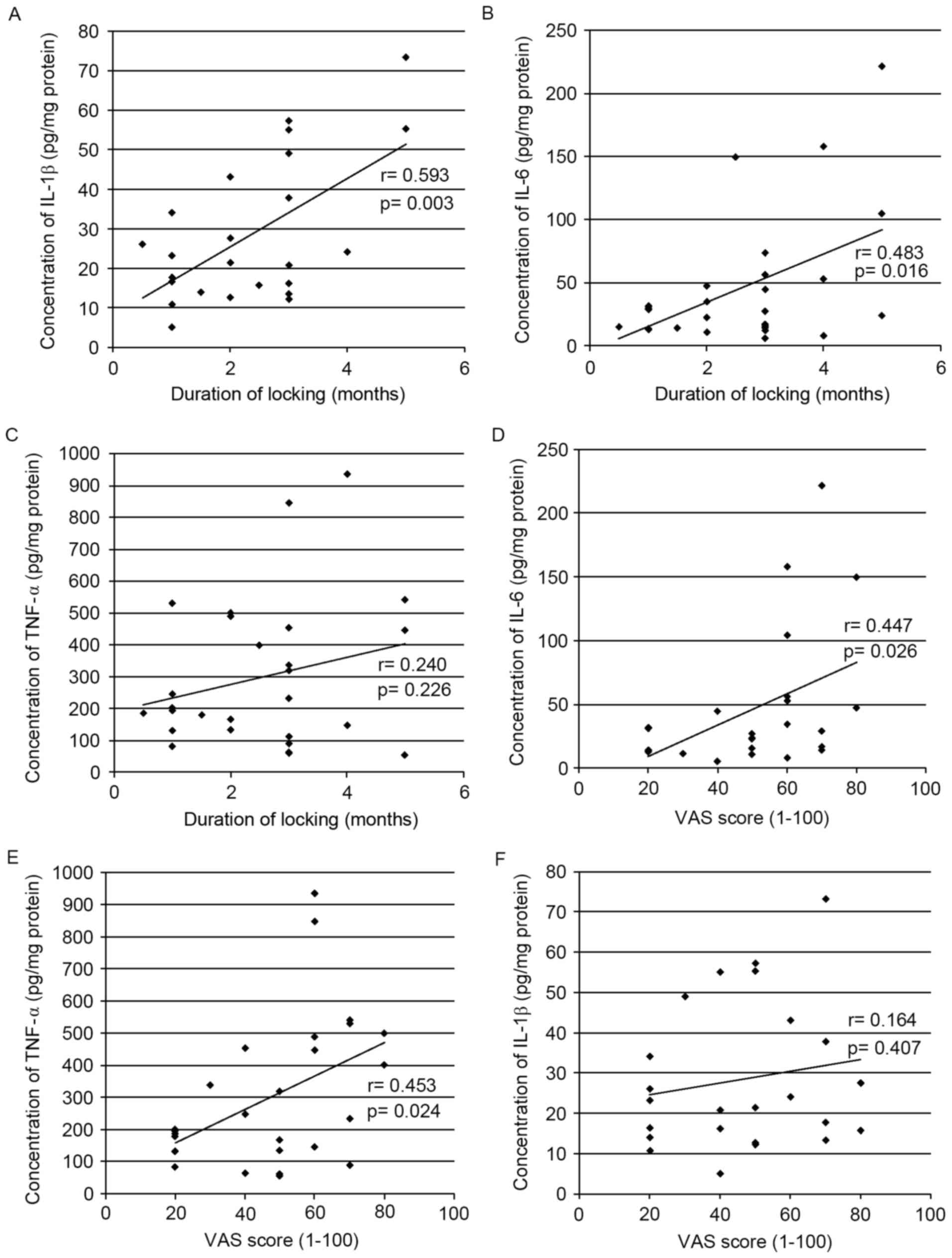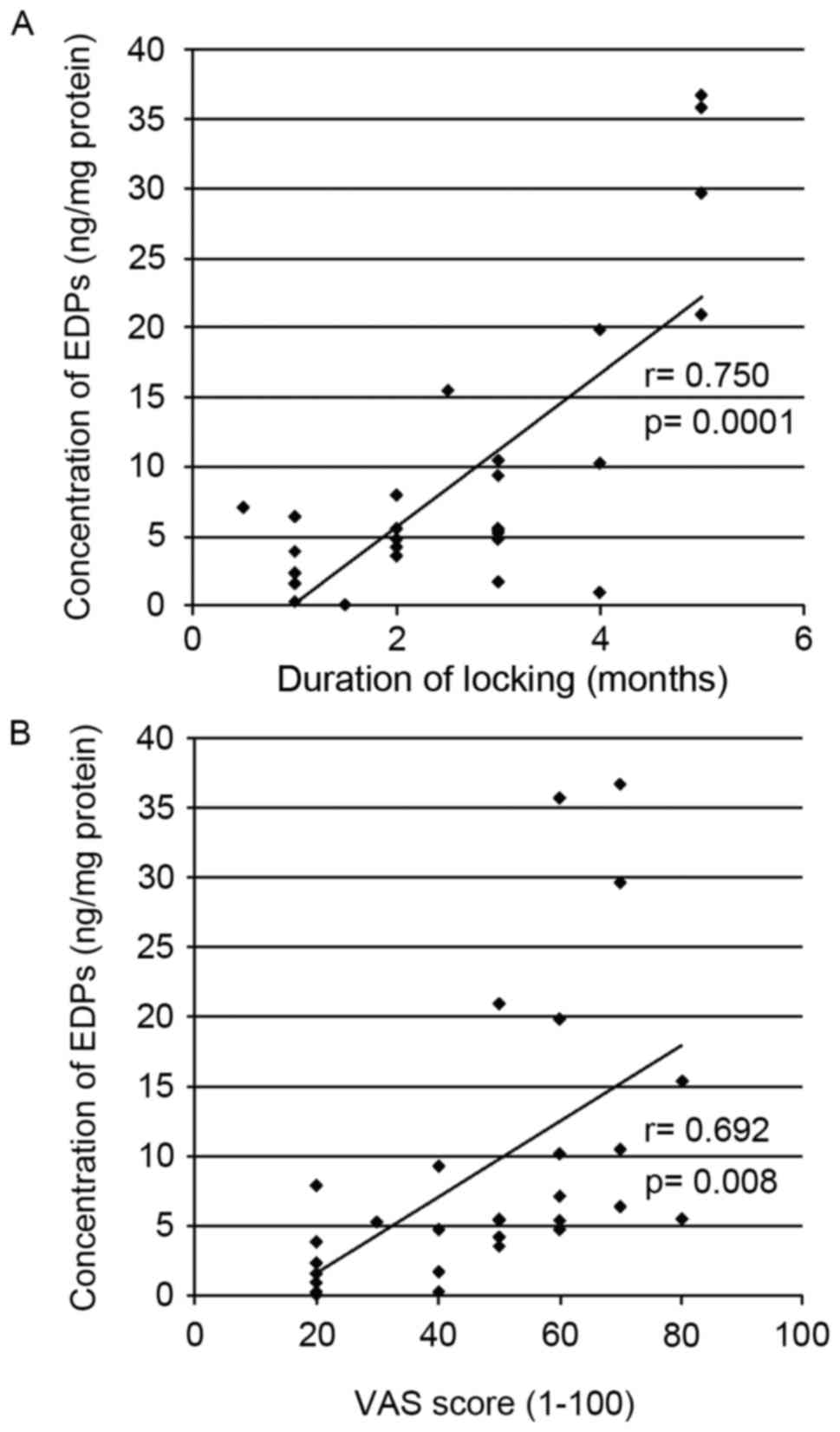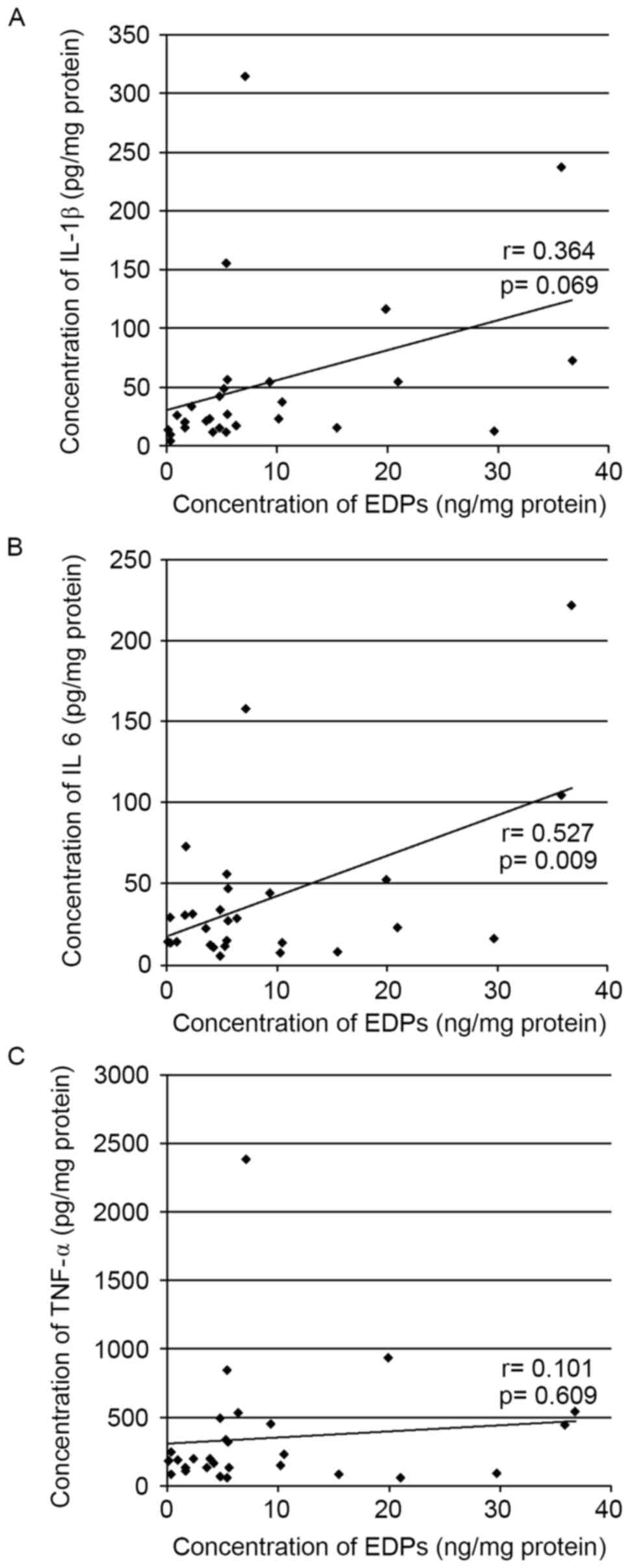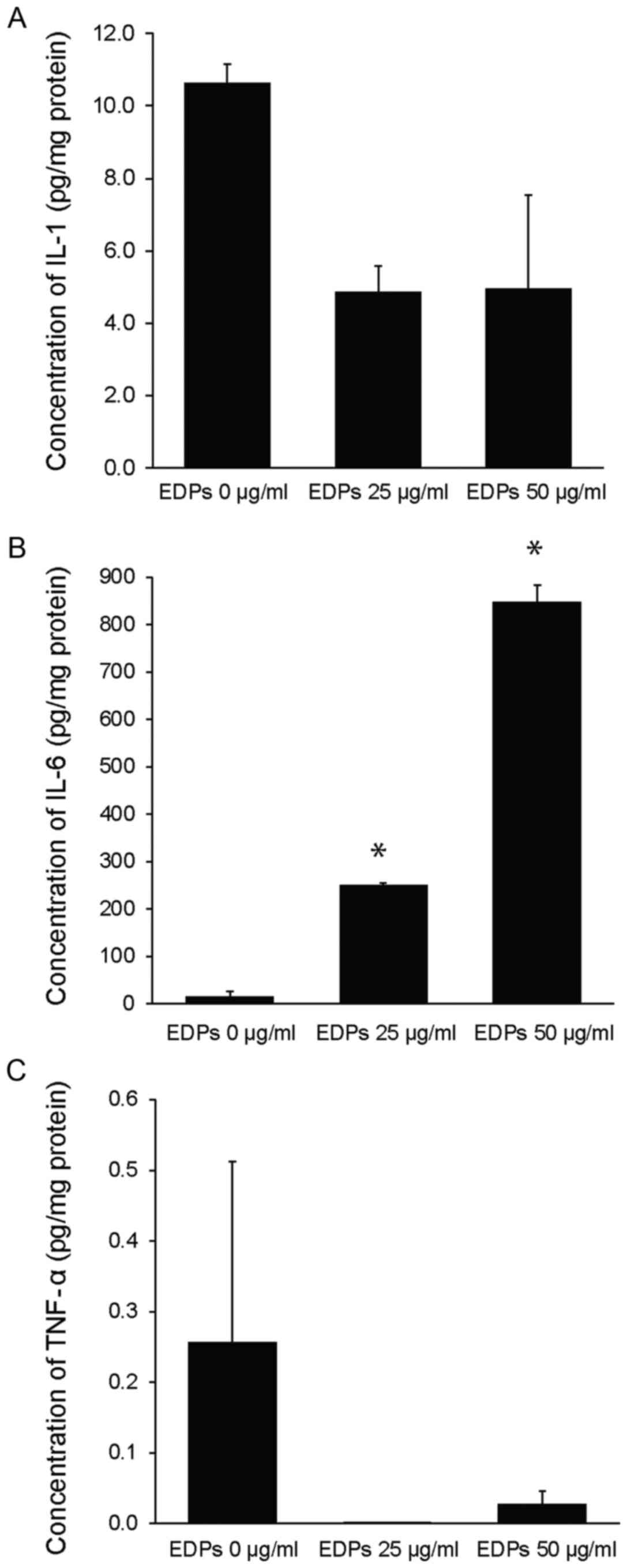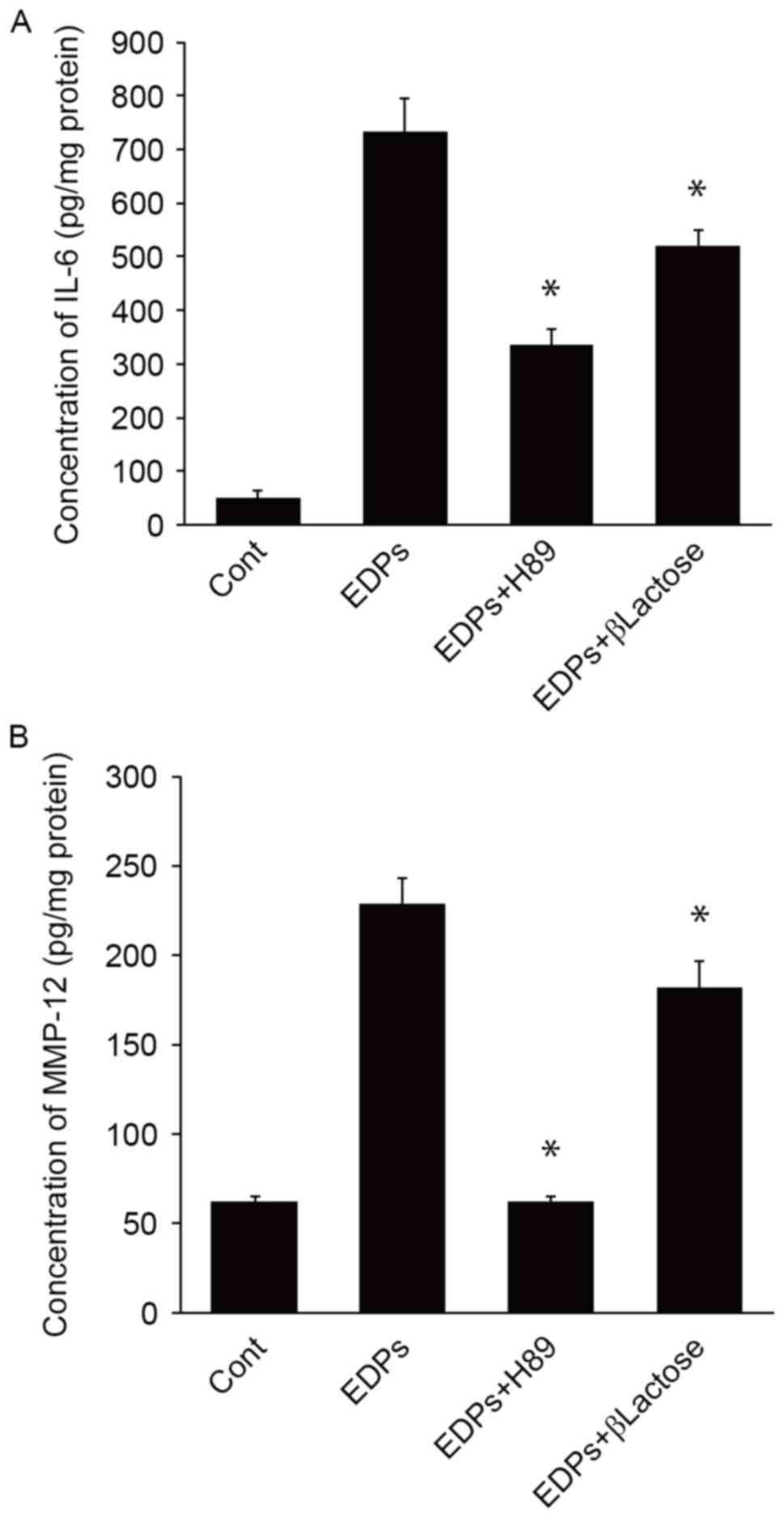|
1
|
Carls FR, von Hochstetter A, Makek M and
Engelke W: Diagnostic accuracy of TMJ arthroscopy in correlation to
histological findings. J Craniomaxillofac Surg. 23:75–80. 1995.
View Article : Google Scholar : PubMed/NCBI
|
|
2
|
Dijkgraaf LC, Liem RS and de Bont LG:
Synovial membrane involvement in osteoarthritic temporomandibular
joints: A light microscopic study. Oral Surg Oral Med Oral Pathol
Oral Radiol Endod. 83:373–386. 1997. View Article : Google Scholar : PubMed/NCBI
|
|
3
|
Gynther GW, Holmlund AB, Reinholt FP and
Lindblad S: Temporomandibular joint involvement in generalized
osteoarthritis and rheumatoid arthritis: A clinical, arthroscopic,
histologic, and immunohistochemical study. Int J Oral Maxillofac
Surg. 26:10–16. 1997. View Article : Google Scholar : PubMed/NCBI
|
|
4
|
Gynther GW, Dijkgraaf LC, Reinholt FP,
Holmlund AB, Liem RS and de Bont LG: Synovial inflammation in
arthroscopically obtained biopsy specimens from the
temporomandibular joint: A review of the literature and a proposed
histologic grading system. J Oral Maxillofac Surg. 56:1281–1287.
1998. View Article : Google Scholar : PubMed/NCBI
|
|
5
|
Kardel R, Ulfgren AK, Reinholt FP and
Holmlund A: Inflammatory cell and cytokine patterns in patients
with painful clicking and osteoarthritis in the temporomandibular
joint. Int J Oral Maxillofac Surg. 32:390–396. 2003. View Article : Google Scholar : PubMed/NCBI
|
|
6
|
Satoh K, Ogura N, Akutsu M, Kuboyama N,
Kuyama K, Yamamoto H and Kondoh T: Expression of cyclooxygenase-1
and −2 in IL-1beta-induced synovitis of the temporomandibular
joint. J Oral Pathol Med. 38:584–590. 2009. View Article : Google Scholar : PubMed/NCBI
|
|
7
|
Shafer DM, Assael L, White LB and
Rossomando EF: Tumor necrosis factor-alpha as a biochemical marker
of pain and outcome in temporomandibular joints with internal
derangements. J Oral Maxillofac Surg. 52:786–792. 1994. View Article : Google Scholar : PubMed/NCBI
|
|
8
|
Fu K, Ma X, Zhang Z and Chen W: Tumor
necrosis factor in synovial fluid of patients with
temporomandibular disorders. J Oral Maxillofac Surg. 53:424–426.
1995. View Article : Google Scholar : PubMed/NCBI
|
|
9
|
Kubota E, Kubota T, Matsumoto J, Shibata T
and Murakami KI: Synovial fluid cytokines and proteinases as
markers of temporomandibular joint disease. J Oral Maxillofac Surg.
56:192–198. 1998. View Article : Google Scholar : PubMed/NCBI
|
|
10
|
Sandler NA, Buckley MJ, Cillo JE and Braun
TW: Correlation of inflammatory cytokines with arthroscopic
findings in patients with temporomandibular joint internal
derangements. J Oral Maxillofac Surg. 56:534–544. 1998. View Article : Google Scholar : PubMed/NCBI
|
|
11
|
Takahashi T, Kondoh T, Fukuda M, Yamazaki
Y, Toyosaki T and Suzuki R: Proinflammatory cytokines detectable in
synovial fluids from patients with temporomandibular disorders.
Oral Surg Oral Med Oral Pathol Oral Radiol Endod. 85:135–141. 1998.
View Article : Google Scholar : PubMed/NCBI
|
|
12
|
Kaneyama K, Segami N, Nishimura M, Suzuki
T and Sato J: Importance of proinflammatory cytokines in synovial
fluid from 121 joints with temporomandibular disorders. Br J Oral
Maxillofac Surg. 40:418–423. 2002. View Article : Google Scholar : PubMed/NCBI
|
|
13
|
Nishimura M, Segami N, Kaneyama K, Sato J
and Fujimura K: Comparison of cytokine level in synovial fluid
between successful and unsuccessful cases in arthrocentesis of the
temporomandibular joint. J Oral Maxillofac Surg. 62:284–288. 2004.
View Article : Google Scholar : PubMed/NCBI
|
|
14
|
Muiznieks LD, Weiss AS and Keeley FW:
Structural disorder and dynamics of elastin. Biochem Cell Biol.
88:239–250. 2010. View
Article : Google Scholar : PubMed/NCBI
|
|
15
|
Hornebeck W and Robert L: Elastase-like
enzymes in aortas and human breast carcinomas: Quantitative
variations with age and pathology. Adv Exp Med Biol. 79:145–164.
1977. View Article : Google Scholar : PubMed/NCBI
|
|
16
|
Hornebeck W, Emonard H, Monboisse JC and
Bellon G: Matrix-directed regulation of pericellular proteolysis
and tumor progression. Semin Cancer Biol. 12:231–241. 2002.
View Article : Google Scholar : PubMed/NCBI
|
|
17
|
Gayral S, Garnotel R, Castaing-Berthou A,
Blaise S, Fougerat A, Berge E, Montheil A, Malet N, Wymann MP,
Maurice P, et al: Elastin-derived peptides potentiate
atherosclerosis through the immune Neu1-PI3Kγ pathway. Cardiovasc
Res. 102:118–127. 2014. View Article : Google Scholar : PubMed/NCBI
|
|
18
|
Scandolera A, Odoul L, Salesse S, Guillot
A, Blaise S, Kawecki C, Maurice P, El Btaouri H, Romier-Crouzet B,
Martiny L, et al: The elastin receptor complex: A unique
matricellular receptor with high anti-tumoral potential. Front
Pharmacol. 7:322016. View Article : Google Scholar : PubMed/NCBI
|
|
19
|
Duca L, Floquet N, Alix AJ, Haye B and
Debelle L: Elastin as a matrikine. Crit Rev Oncol Hematol.
49:235–244. 2004. View Article : Google Scholar : PubMed/NCBI
|
|
20
|
Bravetti P, Membre H, El Haddioui A,
Gérard H, Fyard JP, Mahler P and Gaudy JF: Histological study of
the human temporo-mandibular joint and its surrounding muscles.
Surg Radiol Anat. 26:371–378. 2004. View Article : Google Scholar : PubMed/NCBI
|
|
21
|
Scapino RP: Histopathology associated with
malposition of the human temporomandibular joint disc. Oral Surg
Oral Med Oral Pathol. 55:382–397. 1983. View Article : Google Scholar : PubMed/NCBI
|
|
22
|
Benigno MI, Azeredo RA, Lemos JL, Júnior B
König and Liberti EA: The structure of the bilaminar zone in the
human temporomandibular joint: A light and scanning electron
microscopy study in young and elderly subjects. J Oral Rehabil.
28:113–119. 2001. View Article : Google Scholar : PubMed/NCBI
|
|
23
|
Hall MB, Brown RW and Baughman RA:
Histologic appearance of the bilaminar zone in internal derangement
of the temporomandibular joint. Oral Surg Oral Med Oral Pathol.
58:375–381. 1984. View Article : Google Scholar : PubMed/NCBI
|
|
24
|
Minarelli AM and Liberti EA: A microscopic
survey of the human temporomandibular joint disc. J Oral Rehabil.
24:835–840. 1997. View Article : Google Scholar : PubMed/NCBI
|
|
25
|
Thilander B, Carlsson GE and Ingervall B:
Postnatal development of the human temporomandibular joint I. A
histological study. Acta Odontol Scand. 34:117–126. 1976.
View Article : Google Scholar : PubMed/NCBI
|
|
26
|
Toller PA: Ultrastructure of the condylar
articular surface in severe mandibular pain-dysfunction syndrome.
Int J Oral Surg. 6:297–312. 1977. View Article : Google Scholar : PubMed/NCBI
|
|
27
|
Pereira FJ, Lundh H, Eriksson L and
Westesson PL: Microscopic changes in the retrodiscal tissues of
painful temporomandibular joints. J Oral Maxillofac Surg.
54:461–469. 1996. View Article : Google Scholar : PubMed/NCBI
|
|
28
|
Alstergren P, Kopp S and Theodorsson E:
Synovial fluid sampling from the temporomandibular joint: Sample
quality criteria and levels of interleukin-1 beta and serotonin.
Acta Odontol Scand. 57:16–22. 1999. View Article : Google Scholar : PubMed/NCBI
|
|
29
|
Skeie JM, Hernandez J, Hinek A and Mullins
RF: Molecular responses of choroidal endothelial cells to elastin
derived peptides through the elastin-binding protein (GLB1). Matrix
Biol. 31:113–119. 2012. View Article : Google Scholar : PubMed/NCBI
|
|
30
|
Almine JF, Wise SG, Hiob M, Singh NK,
Tiwari KK, Vali S, Abbasi T and Weiss AS: Elastin sequences trigger
transient proinflammatory responses by human dermal fibroblasts.
FASEB J. 27:3455–3465. 2013. View Article : Google Scholar : PubMed/NCBI
|
|
31
|
Kaneyama K, Segami N, Sun W, Sato J and
Fujimura K: Analysis of tumor necrosis factor-alpha, interleukin-6,
interleukin-1beta, soluble tumor necrosis factor receptors I and
II, interleukin-6 soluble receptor, interleukin-1 soluble receptor
type II, interleukin-1 receptor antagonist, and protein in the
synovial fluid of patients with temporomandibular joint disorders.
Oral Surg Oral Med Oral Pathol Oral Radiol Endod. 99:276–284. 2005.
View Article : Google Scholar : PubMed/NCBI
|
|
32
|
Vernal R, Velásquez E, Gamonal J,
Garcia-Sanz JA, Silva A and Sanz M: Expression of proinflammatory
cytokines in osteoarthritis of the temporomandibular joint. Arch
Oral Biol. 53:910–915. 2008. View Article : Google Scholar : PubMed/NCBI
|
|
33
|
Fu K, Ma X, Zhang Z, Pang X and Chen W:
Interleukin-6 in synovial fluid and HLA-DR expression in synovium
from patients with temporomandibular disorders. J Orofac Pain.
9:131–137. 1995.PubMed/NCBI
|
|
34
|
Kaneyama K, Segami N, Sato J, Nishimura M
and Yoshimura H: Interleukin-6 family of cytokines as biochemical
markers of osseous changes in the temporomandibular joint
disorders. Br J Oral Maxillofac Surg. 42:246–250. 2004. View Article : Google Scholar : PubMed/NCBI
|
|
35
|
Lee JK, Cho YS and Song SI: Relationship
of synovial tumor necrosis factor alpha and interleukin 6 to
temporomandibular disorder. J Oral Maxillofac Surg. 68:1064–1068.
2010. View Article : Google Scholar : PubMed/NCBI
|
|
36
|
Shinoda C and Takaku S: Interleukin-1
beta, interleukin-6, and tissue inhibitor of metalloproteinase-1 in
the synovial fluid of the temporomandibular joint with respect to
cartilage destruction. Oral Dis. 6:383–390. 2000. View Article : Google Scholar : PubMed/NCBI
|
|
37
|
Wake M, Hamada Y, Kumagai K, Tanaka N,
Ikeda Y, Nakatani Y, Suzuki R and Fukui N: Up-regulation of
interleukin-6 and vascular endothelial growth factor-A in the
synovial fluid of temporomandibular joints affected by synovial
chondromatosis. Br J Oral Maxillofac Surg. 51:164–169. 2013.
View Article : Google Scholar : PubMed/NCBI
|
|
38
|
Kaneyama K, Segami N, Nishimura M, Sato J,
Suzuki T and Fujimura K: Osteoclastogenesis inhibitory
factor/osteoprotegerin in synovial fluid from patients with
temporomandibular disorders. Int J Oral Maxillofac Surg.
32:404–407. 2003. View Article : Google Scholar : PubMed/NCBI
|
|
39
|
Sato S, Goto S, Kamakura S and Motegi K:
Morphologic changes in the elastic fibers of the temporomandibular
joint after experimental disc perforation in the rabbit. J Oral
Maxillofac Surg. 56:753–759. 1998. View Article : Google Scholar : PubMed/NCBI
|
|
40
|
Ali AM, Sharawy M, O'Dell NL and al-Behery
G: Morphological alterations in the elastic fibers of the rabbit
craniomandibular joint following experimentally induced anterior
disk displacement. Acta Anat (Basel). 147:159–167. 1993. View Article : Google Scholar : PubMed/NCBI
|
|
41
|
Leonardi R, Villari L, Bernasconi G and
Caltabiano M: Histochemical study of the elastic fibers in
pathologic human temporomandibular joint discs. J Oral Maxillofac
Surg. 59:1186–1192. 2001. View Article : Google Scholar : PubMed/NCBI
|
|
42
|
Duca L, Lambert E, Debret R, Rothhut B,
Blanchevoye C, Delacoux F, Hornebeck W, Martiny L and Debelle L:
Elastin peptides activate extracellular signal-regulated kinase 1/2
via a Ras-independent mechanism requiring both p110gamma/Raf-1 and
protein kinase A/B-Raf signaling in human skin fibroblasts. Mol
Pharmacol. 67:1315–1324. 2005. View Article : Google Scholar : PubMed/NCBI
|
|
43
|
Simionescu A, Philips K and Vyavahare N:
Elastin-derived peptides and TGF-beta1 induce osteogenic responses
in smooth muscle cells. Biochem Biophys Res Commun. 334:524–532.
2005. View Article : Google Scholar : PubMed/NCBI
|
|
44
|
Houghton AM, Quintero PA, Perkins DL,
Kobayashi DK, Kelley DG, Marconcini LA, Mecham RP, Senior RM and
Shapiro SD: Elastin fragments drive disease progression in a murine
model of emphysema. J Clin Invest. 116:753–759. 2006. View Article : Google Scholar : PubMed/NCBI
|
|
45
|
Robinet A, Fahem A, Cauchard JH, Huet E,
Vincent L, Lorimier S, Antonicelli F, Soria C, Crepin M, Hornebeck
W and Bellon G: Elastin-derived peptides enhance angiogenesis by
promoting endothelial cell migration and tubulogenesis through
upregulation of MT1-MMP. J Cell Sci. 118:343–356. 2005. View Article : Google Scholar : PubMed/NCBI
|
|
46
|
Gabay C: Interleukin-6 and chronic
inflammation. Arthritis Res Ther. 8:(Suppl 2). S32006. View Article : Google Scholar : PubMed/NCBI
|
|
47
|
Flannery CR, Little CB, Hughes CE, Curtis
CL, Caterson B and Jones SA: IL-6 and its soluble receptor augment
aggrecanase-mediated proteoglycan catabolism in articular
cartilage. Matrix Biol. 19:549–553. 2000. View Article : Google Scholar : PubMed/NCBI
|
|
48
|
Romagnani S: Lymphokine production by
human T cells in disease states. Annu Rev Immunol. 12:227–257.
1994. View Article : Google Scholar : PubMed/NCBI
|
|
49
|
Abbas AK, Murphy KM and Sher A: Functional
diversity of helper T lymphocytes. Nature. 383:787–793. 1996.
View Article : Google Scholar : PubMed/NCBI
|
|
50
|
Aarvak T, Chabaud M, Thoen J, Miossec P
and Natvig JB: Changes in the Th1 or Th2 cytokine dominance in the
synovium of rheumatoid arthritis (RA): A kinetic study of the Th
subsets in one unusual RA patient. Rheumatology (Oxford).
39:513–522. 2000. View Article : Google Scholar : PubMed/NCBI
|
|
51
|
Anguita J, Rincón M, Samanta S, Barthold
SW, Flavell RA and Fikrig E: Borrelia burgdorferi-infected,
interleukin-6-deficient mice have decreased Th2 responses and
increased lyme arthritis. J Infect Dis. 178:1512–1515. 1998.
View Article : Google Scholar : PubMed/NCBI
|
|
52
|
Helbig G and Krzemień S: Clinical
significance of elastin turnover-focus on diseases affecting
elastic fibres. Wiad Lek. 57:360–363. 2004.PubMed/NCBI
|
|
53
|
Jawad R, Elleman C, Vermeer L, Drake AF,
Woodhead B, Martin GP and Royall PG: The measurement of the β/α
anomer composition within amorphous lactose prepared by spray and
freeze drying using a simple (1)H-NMR method. Pharm Res.
29:511–524. 2012. View Article : Google Scholar : PubMed/NCBI
|















